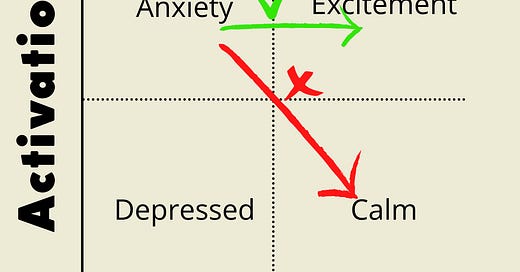We’ve all been there - whether it was sitting in the locker room before a big game as a player or coach, getting ready to give a public speech, or prepping to meet with your boss - we all know what it feels like. The butterflies in your stomach, the rapid heartbeat beating out of your chest, the cold, sweaty hands, and dry mouth. This is often referred to as a high state of activation or arousal, which is our physiological response to a thought or event.
In this week’s 3 Point’s, I’ll examine pre-performance anxiety and why it’s worth getting excited about.
1. A study done by Harvard researcher Dr. Alison Woods Brooks investigated the most productive way to handle pre-performance anxiety. She found that an overwhelming majority of people (more than 90%) believe the best way to manage pre-performance anxiety is to “try to calm down”. The issue with trying to calm down is that, while you may be telling yourself you’re calm, your butterflies, rapid heart beat, and sweaty palms are screaming that you are in fact, not calm.
It's also counterproductive for two reasons:
First, increased activation can enhance performance, it can energize us and keep us alert. Imagine your athletes waiting for the tip-off, kick-off, or opening pitch and hearing the roar of the crowd- you likely don’t want them feeling like they just finished up a spa day.
Second, when we try to resist or suppress our anxious feelings, it can lead to what is called experiential avoidance, which essentially accelerates the same feelings we are trying to avoid.
2. The same study turned their attention to what we should do instead of calming down. They hypothesized that instead of trying to reappraise our anxiety as calm, we should reappraise our anxiety as excitement. Here’s why:
Anxiety and excitement are almost identical physiological states. The only real difference is the story we tell ourselves about it. Previous research has shown that:
Activation interpreted as anxiety is characterized by a negative appraisal, uncertainty and lack of control. Individuals who feel anxious tend to focus on the potential negative outcomes of future events and believe that those outcomes are more likely to occur.
VS.
Activation interpreted as excitement is characterized by a positive appraisal and optimism. In contrast, individuals in an excited state tend to focus on the potential positive outcomes of upcoming events and believe that they can achieve more positive outcomes.
“That's why the shift from anxiety to excitement is so much easier to pull off than trying to calm down. We're no longer trying to change our basic physiology. We're just changing our story about it.” - Nate Klemp

3. Dr. Woods Brooks’ studied three separate performance domains in singing, public speaking and math performance. Throughout multiple studies, Dr. Woods Brooks found that individuals can reappraise their anxiety as excitement by simply stating “I am excited” or by being encouraged to “get excited”.
Further, she found that compared to participants that tried to reappraise their anxiety as calmness or nothing at all, reappraising anxiety as excitement increased the subjective experience of excitement and improved performance in three important performance domains: singing, public speaking, and math.
In this case, the takeaway feels pretty simple: Feel the excitement yourself, realize it is there to help you perform and then encourage your team to do the same.
https://www.apa.org/pubs/journals/releases/xge-a0035325.pdf
https://www.businessinsider.com/harvard-research-says-dont-try-calm-down-when-feel-anxious-2019-9#the-magic-of-anxiety-reappraisal-1




I recently used this idea in a high pressure performance situation and it really did make such a difference switching my thought from “I’m so nervous” to “I’m so excited”